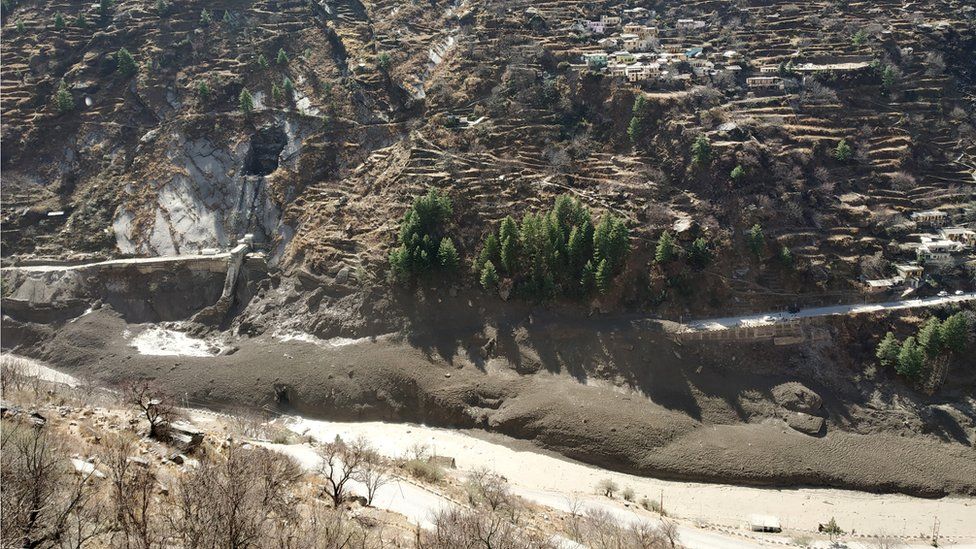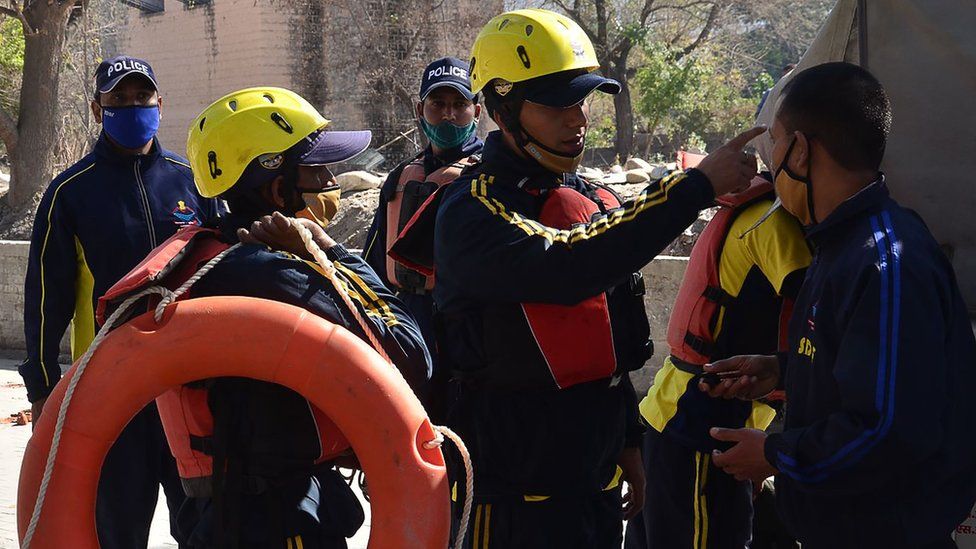Dozens of people are missing and feared dead after a Himalayan glacier crashed into a dam and triggered a huge flood in northern India.
As the dam broke open, a deluge of water poured through a valley in the state of Uttarakhand.
Villages have been evacuated, but officials warned more than 125 people may have been caught in the torrent.
Video showed the floodwater barrelling through the area, leaving destruction in its wake.
One witness said a wall of water and rock sped down the Dhauli Ganga river so quickly there was no time to sound the alarm.
Prime Minister Narendra Modi said he was monitoring the situation. “India stands with Uttarakhand and the nation prays for everyone’s safety there,” he wrote on Twitter.
 IMAGE COPYRIGHTREUTERS
IMAGE COPYRIGHTREUTERSUttarakhand police said the avalanche struck at about 11:00 local time (05:30 GMT), destroying a dam known as the Rishiganga Hydroelectric Project.
Police said the impact catapulted water along the Dhauli Ganga river, damaging another power project downstream in the Tapovan area.
One witness compared the flash flood to “a scene from a Bollywood film”.
Uttarakhand Chief Minister Trivendra Singh Rawat said 125 people were confirmed missing so far, but that number could rise.
“Seven bodies have been recovered from the site and rescue operations are going on,” Mr Singh Rawat told reporters at a briefing on Sunday.
Most of those missing were workers at the two power projects swept away by the deluge.
More than 50 people working at the Rishiganga Hydroelectric Project were feared dead, Uttarakhand police chief Ashok Kumar said.
But he said some workers had been rescued from the site.
Emergency crew managed to rescue 16 workers who had been trapped inside a tunnel that had been filled with debris.
Indian media said around 30 others were trapped in a second tunnel, with emergency crews prepared to work through the night to rescue them.
Mr Singh Rawat said teams from the police and the army were “doing their best to save the lives of the workers”.
 IMAGE COPYRIGHTAFP
IMAGE COPYRIGHTAFPEmergency workers evacuated dozens of villages, but authorities later said the main flood danger had passed.
Hundreds of troops, along with military helicopters and other aircraft, have been sent to the region. They will begin searching for survivors on Monday morning.
The neighbouring state of Uttar Pradesh has put some riverside areas on high alert for flooding.
Experts are investigating the incident.
What caused the glacial burst?
Navin Singh Khadka, BBC World Service environment correspondent
The remoteness of where this happened means no-one has a definitive answer, so far.
Experts say one possibility is that massive ice blocks broke off the glacier due to a temperature rise, releasing a huge amount of water.
And that could have caused avalanches bringing down rocks and mud.
“This is a strong possibility because there was a huge amount of sediment flowing down,” said DP Dobhal, a senior glaciologist formerly with the government’s Wadia Institute of Himalayan Geology.
Experts say an avalanche could also have hit a glacial lake that then burst.
Another possibility is that an avalanche or landslide may have dammed the river for some time, causing it to burst out after the water level rose.

Uttarakhand, in the western Himalayas, is prone to flash floods and landslides.
Some 6,000 people are believed to have been killed in floods in June 2013 which were triggered by the heaviest monsoon rains in decades.
Sunday’s disaster has prompted calls by environment groups for a review of power projects in the ecologically sensitive mountains.

 Home Of Ghana News Ghana News, Entertainment And More
Home Of Ghana News Ghana News, Entertainment And More




